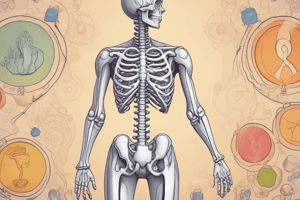Podcast
Questions and Answers
A client taking calcium carbonate reports experiencing persistent constipation. Which of the following interventions is most appropriate?
A client taking calcium carbonate reports experiencing persistent constipation. Which of the following interventions is most appropriate?
- Recommend an over-the-counter anti-diarrheal medication.
- Instruct the client to discontinue the calcium supplement immediately.
- Suggest taking the calcium supplement with milk to ease digestion.
- Advise the client to increase fluid intake and incorporate more high-fiber foods in their diet. (correct)
A client is prescribed both calcium citrate and levothyroxine. What instruction should the nurse provide regarding the timing of these medications?
A client is prescribed both calcium citrate and levothyroxine. What instruction should the nurse provide regarding the timing of these medications?
- It does not matter when these medications are taken.
- Take the calcium citrate 1 to 2 hours before or after the levothyroxine. (correct)
- Take the levothyroxine 1 to 2 hours before the calcium citrate.
- Take both medications together with breakfast.
Which finding would be a contraindication for the administration of calcium supplements?
Which finding would be a contraindication for the administration of calcium supplements?
- History of gastric ulcers
- Hypercalcemia (correct)
- Hypocalcemia
- Irritable bowel syndrome
A client taking a thiazide diuretic is prescribed calcium supplements. What potential interaction should the nurse monitor for?
A client taking a thiazide diuretic is prescribed calcium supplements. What potential interaction should the nurse monitor for?
A client reports flank pain and blood in their urine while taking calcium supplements. Which of the following actions should the nurse take first?
A client reports flank pain and blood in their urine while taking calcium supplements. Which of the following actions should the nurse take first?
Why should a client avoid taking Calcium supplements with foods such as spinach?
Why should a client avoid taking Calcium supplements with foods such as spinach?
A client with low gastric motility is prescribed calcium supplements. Which form of calcium supplement is generally recommended for better absorption?
A client with low gastric motility is prescribed calcium supplements. Which form of calcium supplement is generally recommended for better absorption?
A client taking phenytoin for seizures is prescribed calcium supplements. What potential drug interaction should the nurse consider?
A client taking phenytoin for seizures is prescribed calcium supplements. What potential drug interaction should the nurse consider?
A postmenopausal client is prescribed calcium carbonate to prevent osteoporosis. What instruction should the nurse include regarding the timing of this medication?
A postmenopausal client is prescribed calcium carbonate to prevent osteoporosis. What instruction should the nurse include regarding the timing of this medication?
A client taking calcium citrate reports experiencing persistent nausea and constipation. Which intervention should the nurse implement first?
A client taking calcium citrate reports experiencing persistent nausea and constipation. Which intervention should the nurse implement first?
An adolescent client with lactose intolerance is prescribed a calcium supplement. What information should the nurse provide regarding the rationale for this prescription?
An adolescent client with lactose intolerance is prescribed a calcium supplement. What information should the nurse provide regarding the rationale for this prescription?
A client receiving long-term calcium supplementation is also taking high doses of vitamin D. Which assessment finding would warrant immediate intervention by the nurse?
A client receiving long-term calcium supplementation is also taking high doses of vitamin D. Which assessment finding would warrant immediate intervention by the nurse?
What is the primary therapeutic use of calcium supplements, as indicated in the provided information?
What is the primary therapeutic use of calcium supplements, as indicated in the provided information?
A client taking calcium carbonate for gastric hyperacidity reports taking the supplement with other medications. Which other medication taken by the client will be affected by taking the calcium supplement?
A client taking calcium carbonate for gastric hyperacidity reports taking the supplement with other medications. Which other medication taken by the client will be affected by taking the calcium supplement?
A client with a history of kidney stones is prescribed calcium supplements. Which intervention is most important for the nurse to implement?
A client with a history of kidney stones is prescribed calcium supplements. Which intervention is most important for the nurse to implement?
During a routine check-up, a client on long-term calcium supplements exhibits decreased gastric and intestinal motility. Which adverse effect is likely contributing to this condition?
During a routine check-up, a client on long-term calcium supplements exhibits decreased gastric and intestinal motility. Which adverse effect is likely contributing to this condition?
Flashcards
Calcium Supplements
Calcium Supplements
Medications like calcium citrate and calcium carbonate used to increase calcium levels in the body.
Hypercalcemia
Hypercalcemia
A condition characterized by abnormally high levels of calcium in the blood.
Signs of Hypercalcemia
Signs of Hypercalcemia
Constipation, nausea, vomiting, increased urine output and depression.
Calcium Supplement Timing
Calcium Supplement Timing
Signup and view all the flashcards
Kidney Stones: Contraindication
Kidney Stones: Contraindication
Signup and view all the flashcards
Cardiac Dysrhythmias: Contraindication
Cardiac Dysrhythmias: Contraindication
Signup and view all the flashcards
Thiazide Diuretics Interaction
Thiazide Diuretics Interaction
Signup and view all the flashcards
Glucocorticoids Interaction
Glucocorticoids Interaction
Signup and view all the flashcards
Who benefits from Calcium?
Who benefits from Calcium?
Signup and view all the flashcards
Vitamin D and Calcium
Vitamin D and Calcium
Signup and view all the flashcards
Calcium Supplement Monitoring
Calcium Supplement Monitoring
Signup and view all the flashcards
Drugs Interacting with Calcium
Drugs Interacting with Calcium
Signup and view all the flashcards
Timing of Calcium Doses
Timing of Calcium Doses
Signup and view all the flashcards
Administering Oral Calcium
Administering Oral Calcium
Signup and view all the flashcards
Study Notes
- Calcium supplement medications include calcium citrate and calcium carbonate.
Therapeutic Use
- Used to treat hypocalcemia
- Prescribed for clients at risk of calcium deficiency
- Recommended for adolescents
- Recommended for pregnant, breastfeeding, or postmenopausal clients
- Can treat increased stomach acid
- Prescribed for clients at risk for osteoporosis due to age or lactose intolerance
Adverse Drug Reactions
- Can cause hypercalcemia
- More likely with high vitamin D intake
- More likely with long-term use
- Can cause nausea, vomiting and constipation
- Can cause kidney stones for predisposed clients
Interventions
- Monitor serum calcium levels periodically
- Monitor for decreased gastric and intestinal motility
- Monitor urine output, ensuring it exceeds intake
- Monitor for flank pain and blood in urine
Administration
- Can be given orally or intravenously
- Give 1 hour before or 1-2 hours after taking glucocorticoids, thyroid supplements, tetracycline, and quinolone antibiotics
- Give calcium-based antacids 1 hour after meals and at bedtime
- Chewable tablets should be chewed before swallowing
- Give with a glass of water
Client Instructions
- Teach signs of hypercalcemia: constipation, nausea, vomiting, increased urine output, depression.
- Take calcium supplements as prescribed; don't take additional doses
- Report nausea and vomiting
- Eat a high-fiber diet and take a laxative as necessary for constipation
- Report flank pain or blood in urine
- Take calcium supplements 1-2 hr before or after taking glucocorticoids, thyroid supplements, tetracycline and quinolone antibiotics
- Take calcium-based antacids 1 hr after meals and at bedtime
- Chew tablets before swallowing
- Drink a glass of water after swallowing
- Do not take more than 600 mg at one time
- Compare dose with bioavailable amount of calcium in product
Contraindications
- Hypercalcemia
- Kidney stones
- Low phosphate levels
- Cardiac dysrhythmias
- Low gastric motility
Precautions
- Thiazide diuretics cause decreased calcium excretion, potentially leading to hypercalcemia
Interactions
- Calcium supplements decrease absorption of thyroid hormones, tetracycline and fluoroquinolone antibiotics, bisphosphonates, and phenytoin
- Glucocorticoids reduce oral calcium supplements absorption
- Avoid taking calcium with foods such as cereals, rhubarb, and spinach
Studying That Suits You
Use AI to generate personalized quizzes and flashcards to suit your learning preferences.
Related Documents
Description
Learn about calcium supplements like calcium citrate and calcium carbonate, their therapeutic uses in treating hypocalcemia and preventing osteoporosis. Understand potential adverse effects such as hypercalcemia and kidney stones. Review important nursing interventions and administration guidelines.




